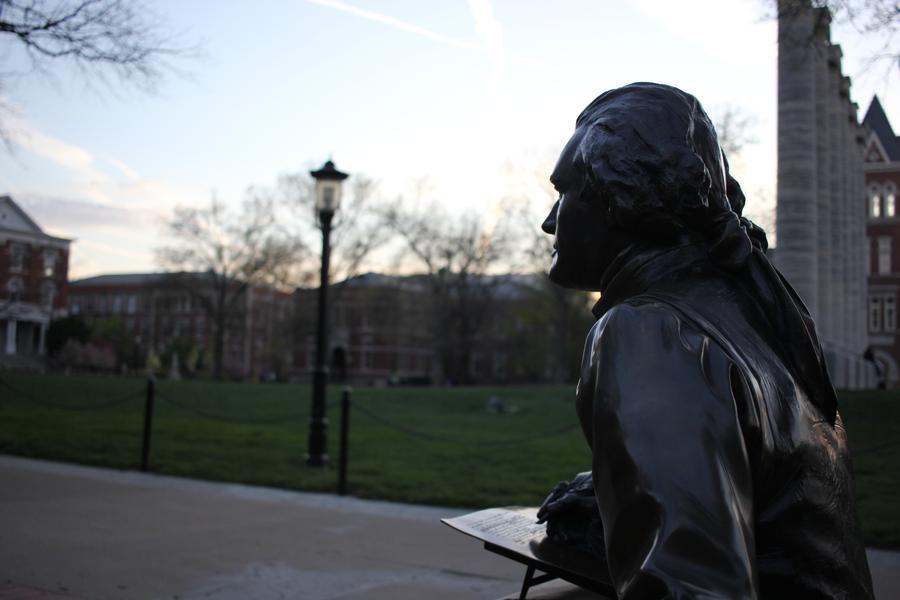Months after students began talking about Thomas Jefferson’s legacy and the significance of his statue sitting on Francis Quadrangle, the debate about the statue’s racial implications isn’t going away.
[Last semester’s debate](https://www.themaneater.com/stories/2015/10/28/discussion-surrounding-jefferson-statue-plus-peopl/) surrounding the Jefferson statue continued with a public forum on Monday hosted by the Kinder Institute on Constitutional Democracy. Students and historians disagreed about Jefferson’s place in history and at MU, but a consensus was clear: The discussion about the statue should be continued.
The debate began last August, when Concerned Student 1950 member Maxwell Little [started a petition](https://www.change.org/p/the-university-of-missouri-remove-the-statue-of-thomas-jefferson-from-campus) to remove the statue from campus. Two months later in October, the Student Coalition for Critical Action started the hashtag #PostYourStateOfMind and posted sticky notes calling Jefferson a “rapist,” “slave owner” and “misogynist.”
Two weeks after the SCCA’s event, the MU College Republicans countered with #StandWithJefferson and started a petition of their own to keep the statue on campus. They also posted sticky notes on Jefferson’s statue, but they said “Thank You,” “Freedom Fighter” and “President.”
Annette Gordon-Reed and Peter Onuf, co-authors of the book “‘Most Blessed of the Patriarchs’: Thomas Jefferson and the Empire of Imagination” and professors at Harvard University and the University of Virginia, respectively, were two of the panelists in Monday’s forum. Little also joined the two professors to discuss Jefferson’s legacy in contemporary America. Roughly 40 people attended the forum.
Little opened the forum with a statement reiterating his sentiments from the fall, denouncing what the Jefferson statue symbolized.
“To the marginalized student, this statue does not represent excellence, respect or responsibility,” Little said. “The statue of Jefferson is saturated with white supremacy, racism, sexism and exclusion, all of which live here on campus, in Jefferson City and in this nation.”

Annette Gordon-Reed and Peter Onuf, the authors of “‘Most Blessed of the Patriarchs’ Thomas Jefferson and the Empire of the Imagination,” hold an open forum on April 5 in Leadership Auditorium to explain their views of Thomas Jefferson’s legacy. The discussion has been fueled by the debate over removing the Thomas Jefferson statue from campus. Photo by Kaitlin Washburn/Staff Photographer
Gordon-Reed and Onuf understood Little’s point of view but were not supportive of it. Onuf argued that the U.S. would not be where it is today without the contributions of Jefferson and his “fellow patriots.” He agreed that Jefferson should not be worshipped, but he felt that Jefferson needed to be researched and discussed.
“Jefferson believed in a better future; he had hope for justice, he had hope for us,” Onuf said. “We still receive guidance from Jefferson because we believe in the future, and we have hopes for a better Mizzou, a better country and a better world.”
Gordon-Reed echoed Onuf’s statement. She said that Jefferson cannot be held responsible for all the racism in the U.S. and said that energy would be better spent on focusing on uprooting the causes of the problems.
“Rather than see historical figures as objects of worship or objects of derision, we have to think about what they’re useful for,” Gordon-Reed said. “What is their contribution? Jefferson offers the opportunity to talk about the founding, to talk about slavery, to talk about race, to talk about second-class citizenship of African Americans. But all of these critiques can be said about others as well.”
Gordon-Reed said that Jefferson is singled out among the founding fathers because he was one of the only ones who wrote about the racial problems facing the country at the time.
After each panelist made their statements, those who attended were allowed to comment.
Several people brought up the duality of what the statue symbolizes. While he owned slaves and had an affair with one, Sally Hemings, Jefferson also wrote the Declaration of Independence and laid the foundation for important aspects of American life such as free speech and higher education.
Gordon-Reed said that the best way to balance the legacy is through adding a plaque to the statue that explains everything Jefferson did.
“In America, in order to admire somebody, you have to be this good person to admire the things they’ve done,” Gordon-Reed said. “It’s all very personal. I study Jefferson and I can see all of the good things and all of the bad things, and people need to be educated about that.”
The biggest argument between Little, Gordon-Reed and Onuf happened when another audience member asked Little about whether he believed Jefferson did anything honorable for the country.
“No,” Little answered flatly.
“Well it’s hopeless then,” Onuf replied.
Onuf and Gordon-Reed brought up the story of slaves in Massachusetts who wrote a document based on the Declaration of Independence and won their freedom in court. Without Jefferson, they argued, those slaves would not have been freed.
“That’s resistance,” Little said. “It’s a product of racism. Resistance against oppression.”
All three panelists concurred that continued discussion about the statue is most important.
“The conversation has been started because of Ferguson, Trayvon Martin, and it’s absolutely overdue,” Gordon-Reed said. “We’re not going to agree on everything, so we’ve got to have a conversation about it.”
_Edited by Taylor Blatchford | [email protected]_














